昨天,一篇微博长文火了。
博主@卡卡Prancil在文章中讲述了自己突发脑出血,拿到病危通知书的可怕经历……

从9月2日突然发病到11日完全清醒,在过去的9天中,他经历了巨大的痛苦。“主血管没有出血,算是不幸中的万幸。”
图像显示我的主血管没有出血,是多处毛细血管出血。算是不幸中的万幸。

图片:微博网友@卡卡Prancil
不过,整个治疗过程特别可怕:
每6个小时打一组药,每天打20多瓶药,止血、吸收水肿、冲脑。
因为颅压高,吃什么都会引起呕吐,吐到黄胆水都出来。
还有不定期间歇性的头疼,这个疼可不是什么简单头疼,颅压高引起的,脑内有水肿,感觉头随时要炸开。
我嘴里现在还有两个伤口,是夜晚头疼自己无意识咬的。
博主说自己长期熬夜、工作繁忙,再加上平时缺乏运动,导致血管脆弱、没有弹性。
这些都是长期潜伏在身体里的伤害,不知道什么时候就会爆发出来。
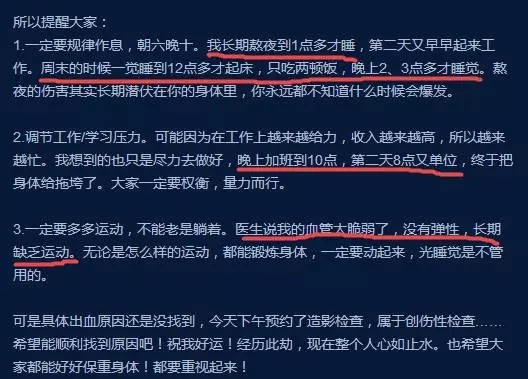
他写下这篇长文来提醒大家规律作息、不要熬夜,注意调节工作/学习压力,多多运动。
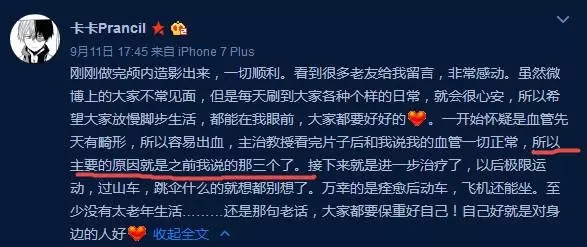
这篇文章戳中了广大熬夜青年的内心,引发了网友的强烈共鸣,评论已超过12万条……
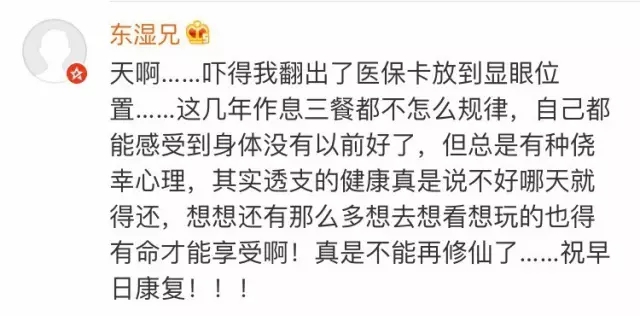
9月以来,类似的新闻多次登上微博热搜榜。
IT男通宵加班4天导致双目失明……

男子连续加班“过劳死”(death from overwork)……

每每看到此类新闻,不禁让人心头一紧。
熬夜加班、熬夜备考、熬夜刷剧、熬夜打游戏、熬夜玩手机……“熬夜”的后果就像是悬在大多数人头上的利剑,不知道什么时候会落下。
双语君(微信ID:Chinadaily_Mobile)作为一名前资深熬夜党,必须和大家好好聊聊熬夜的事儿。
不知道什么时候开始,按时睡觉成了我们最难的自律。有时候甚至没有什么事要做,却也非要熬到凌晨才睡觉。
熬夜有诸多危害,首当其冲的就是“脸”……
《每日邮报》上曾刊登过一则报道,46岁的莎拉·查尔默斯(Sarah Chalmers)参加了一个伦敦睡眠学校的测试。
这个测试对比了正常睡眠(8小时)和睡眠不足(6小时)对身体的影响。下图就是连续五天睡眠8小时和6小时之后的对比图……
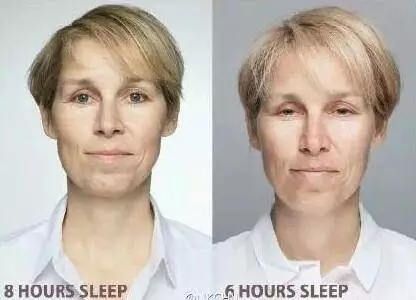
测试者莎拉之后表示,睡眠不足对容貌影响确实很大:黑眼圈、毛孔粗大、长斑、皮肤黯淡无光……
I look much older than my 46 years. My eyes have dark rings underneath and my skin is lacklustre, with pores so enlarged I can see them from a distance. To top it all off, a couple of spots are beginning to develop on my chin.
我看起来比实际年龄46岁要大很多,眼下有黑眼圈、皮肤黯淡无光、毛孔粗大到老远就能看见,最严重的是,我的下巴开始长斑。
Worse still: this is not an isolated incident. For days now, I’ve been forgetful, as well as clumsy and easily upset. And all because I’ve spent the week getting by on six hours sleep a night — just as thousands of other women do.
更糟糕的是,这还没有结束,连着几天,我都好忘事,手脚不灵活,易怒。这都是因为我一周每天都只睡6个小时,和不少其他女性一样。
长期熬夜的危害当然不止这些,TED曾经做过一个小短片,故事发生在1965年,17岁的高中生兰迪·加纳德持续264个小时,也就是11天不睡觉,想看看会发生什么。
第二天:
On the second day, his eyes stopped focusing. Next, he lost the ability to identify objects by touch.
他眼睛不再聚焦,不能通过触摸而辨别物体。
第三天:
By day three, Gardner was moody and uncoordinated.
加纳德变得焦躁且手脚不听使唤。
实验结束时,他已经不能集中注意力,短期记忆力(short term memory)出现问题,变得偏执恐惧(paranoid)并且开始出现幻觉(hallucinating)。
虽然这次实验并没有给男孩造成长期损伤,但是,睡眠的确会导致激素分泌失衡(hormone imbalance)、疾病(illness)甚至死亡(death)。
When we lose sleep, learning, memory, mood, and reaction time are affected.
当缺乏睡眠时,学习能力、记忆力、情绪以及反应能力将会受到影响。
Sleeplessness may also cause inflammation, hallucination,high blood pressure, and it's even been linked to diabetesand obesity.
缺乏睡眠也可能导致炎症、幻觉、高血压,甚至糖尿病和肥胖都与睡眠不足有关。
2014年就有一位死忠球迷(devoted soccer fan)在持续48小时观看世界杯后死亡。
虽说他的早逝归根结底是因为中风,但研究表明,和长期保持7-8小时睡眠的人相比,夜间睡眠长期少于6小时的人中风的风险会增加4.5倍。
美国健康热线(Healthline)网站用一张图说清楚了缺乏睡眠对人体的10大影响:
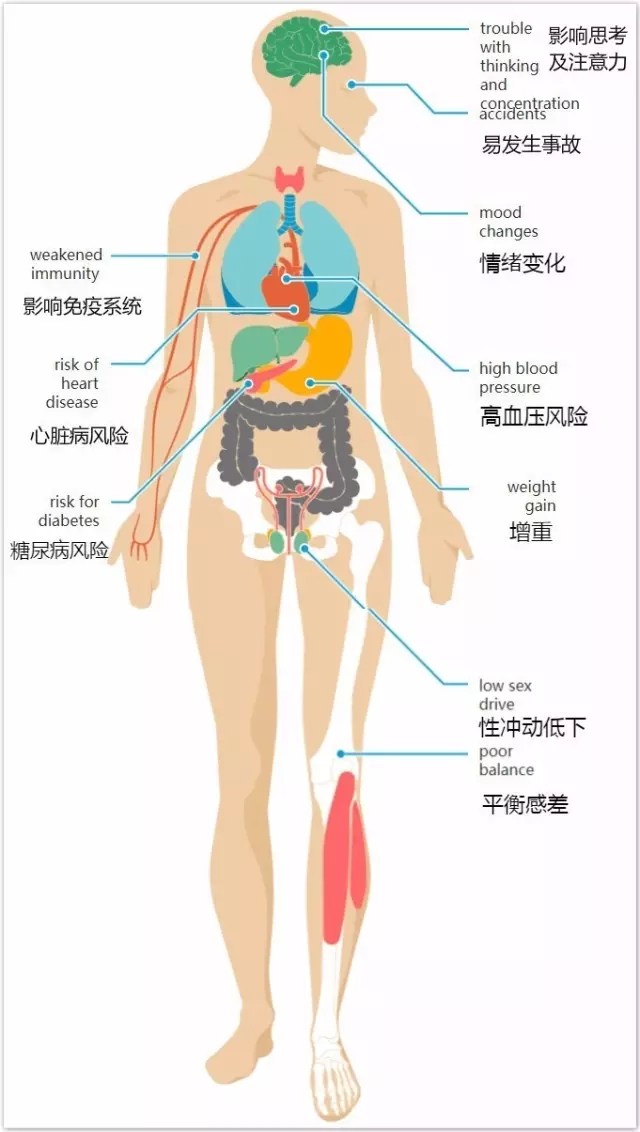
看到这里,你还敢熬夜修仙吗?
很好,为了帮助大家走上正道、睡上饱觉,双语君(微信ID:Chinadaily_Mobile)整理了9条安睡宝典,助你早日脱离修仙党。
Power down an hour before bed.
睡前一个小时关机
Dim the lights and turn off all your devices — smartphones, laptops, TVs — about 60 minutes before bedtime.
睡前1小时左右,卧室灯光调暗,所有设备关机,包括手机、电脑、电视。
Bright light is one of the biggest triggers to our brains that it’s time to be awake and alert, so start sending the opposite signal early.
明亮灯光会让我们的大脑认为现在是清醒的时刻,所以尽早传递相反的信号。
Cut caffeine by the afternoon.
午后不再喝咖啡
Your afternoon jolt stays in your system longer than you might think. Experts recommended laying off the caffeine by early afternoon to guarantee it won’t keep you up in bed later.
午后一杯提神醒脑的咖啡在你体内产生作用的时长恐怕超过你想象。专家建议午后就不要再摄入咖啡因,以避免晚上睡不着。
Exercise regularly.
有规律地锻炼
By exercising regularly, you improve your ability to fall asleep, but make sure you complete your exercise two hours before you go to sleep.
有规律地锻炼,能帮助你更快入眠,但请确保睡前2小时就做完运动。
Avoid heavy meals when it’s late.
太晚就别吃大餐了
Your body isn’t meant to be digesting while you sleep, so a big meal too close to bedtime may keep you up at night. Protein is especially hard to digest, so if you have to eat late, opt for lighter fare.
你的身体在睡觉时的主要任务不是消化食物,所以临近睡觉时间还吃大餐,肯定是睡不着了。蛋白质尤其难消化,如果要吃夜宵,那也选择清淡食物。
Keep your bedroom dark.
卧室保持黑暗
Even the most inconspicuous glow — like that from a digital alarm clock — can disrupt your shuteye. If you can’t seal up all the light sources in your room, consider using a comfy eye-mask.
即使是难以察觉的微光,如电子闹钟的光,也会扰乱你的睡眠。如果你无法断绝房间里的所有光源,考虑用一副舒服的眼罩吧。
Reserve the bed for sleep only.
床只用来睡觉
If you watch TV, study or surf the web while in bed, your body won’t think it’s an area for sleep. To avoid sending your body mixed signals, save your bed for bedtime!
如果你经常躺床上看电视、学习、上网,你的身体会误会床的作用。避免给身体释放矛盾的信号,只在睡觉时间躺在床上。
Nap — wisely.
午睡适度
Nap before 3 p.m. so you won’t interfere with your normal sleep schedule and keep it between 15 to 20 minutes. Napping longer than 20 minutes will leave you feeling groggy, but a shorter nap will refresh you and keep you going.
午睡保持在下午3点之前,以免扰乱正常睡眠时间。午睡时长保持在15-20分钟,超过20分钟会让你感觉昏昏沉沉,短时间的午睡能提神醒脑,让你下午动力十足。
Avoid drinking too many liquids too close to bedtime.
临睡前少喝水
Don’t go dehydrating yourself, but avoid drinking too much water a couple of hours before bed to save yourself middle-of-the-night trips to the loo.
别让身体缺水,但睡前一两小时内少喝水,避免频繁起夜。
Keep a consistent sleep/wake schedule, even on weekends.
即使在周末也保持正常作息
Staying up and sleeping in later than normal can shift your body’s natural clock in the same way that cross-country travel does. This so-called social jet lag can make it extra difficult to fall asleep when Sunday night rolls around, making for even more unpleasant Monday mornings.
晚睡晚起会改变你的生物钟,就像坐跨时区国际航班一样,这种“社会时差”让你在周日夜里极难入睡,周一早晨起来更加难受。
(来源:中国日报双语新闻编辑部)
